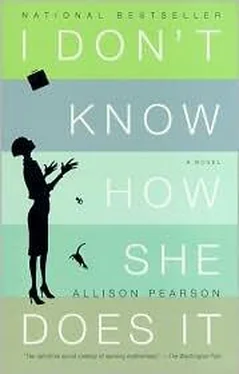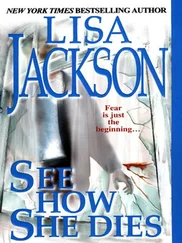Carol Dunstan’s prim drawstring mouth is just opening again when a male voice speaks. “I think we can feel confident, Carol, that with Ms. Reddy’s wide experience of ethical funds she would be up to speed with the employment practices of companies in Ireland.”
Sudden rush of gratitude as heady as oxygen. Jack has flipped the emergency hatch and given me a way out. I nod in eager agreement. “As Mr. Abelhammer says, we have a team which screens for employment policies. On a personal note, I’d like to add that I am fully behind the McMahon Principles, being Irish myself.”
There is a crash behind me. Momo has dropped a file, but this calamity is lost in the general murmur of appreciation for my ethnic credentials. On a tide of goodwill, I move straight into the close. The close is the bit where you say Give us the money. But politely. And without mentioning money.
5:11 P.M.Momo and I are falling into the cab when there is a squeal of leather behind us.
“I’d like to say what a pleasure it was to witness such a performance, Ms. Reddy.”
“Why, thank you, Mr. Abelhammer. I was most grateful for your interjection.”
Caught in the static between Jack and me, Momo looks slightly perplexed.
He rests his hand lightly on the rim of the car door. “I was wondering whether I could interest you both in a drink. Perhaps take in the sights of Shanksville. I see the Sinatra Inn does a cocktail called Come Fly with Me.”
“Actually, Ms. Gumeratne and I are very tired.”
He nods his understanding. “Another time. Take care now.”
On the way back to the hotel, Momo says, “I’m sorry, Kate, but do you know that guy?”
“No, I don’t.” A truthful answer. I don’t know Jack Abelhammer, but I may be in love with him. How can you be in love with someone you don’t know? It’s probably easier, isn’t it, all things considered. A blank screen you can type all your longings on.
“He looks like George Clooney.” Momo sighs. “I think we should have that drink.”
“No. It would be unprofessional before they’ve made their decision. Anyway, we should have our own drink to celebrate. You were a complete star.”
“I’m sorry, Kate, but you were the brilliant one. I couldn’t do what you just did.” Momo permits herself a smile, and I suddenly see how tense her face has been. “I didn’t know you were Irish.”
“Just a little. On my father’s side.”
“Like McMahon?”
“Yes, only without the principles.”
She giggles. “What does your father do?”
“Same line of work as me.”
“He’s a fund manager?”
“No, but like us he gambles a lot on fancied horses, pretends it’s scientific and hopes to God they’ll come home, and when they don’t he leaves town.”
“Good gracious,” says Momo, so shocked she forgets to say sorry for the first time since I met her. “He sounds like a colorful character.”
WHENEVER I TALK ABOUT MY DAD to other people I hear myself adopting a different voice: detached, breezy, ironic. A voice you tell funny stories in. Colorful characters are wonderful in Dickens or as bit parts in movies, when they’re played by bloated ex-matinee idols who can be carried all the way to Best Supporting Actor on a wave of public sympathy; you just don’t want one in your life if you can possibly help it.
“Pretend we’ve got plenty of cash, Kathy duck,” Dad once instructed me. We were sitting in a pub garden at the tag end of a long gray line of northern towns. Julie and I sat on a bench with half-pint glasses of Dandelion & Burdock — a drink that tastes like Pepsi mixed with creosote but was believed by us to be the chosen nectar of sophisticated ladies. I was twelve years old, too dizzy from moving town every six months to know what stable behavior was, and far too in thrall to my father to protest. Of course there wasn’t any money, and when there was it would be spirited out of my mum’s purse by Joe for one of his schemes.
But I pretended we had money. Even then I think I could smell the disappointment settling like damp on my father and I wanted to protect him from it. Disappointment unmans a man so. The women around him have to go on pretending they can’t smell it, with him sitting there, hand shaking, using the other one to steady the glass and insisting that there’s everything still to play for.
Now here’s a funny thing. All the women I know in the City are Daddy’s Girls one way or another. (Candy’s dad walked out when she was five and I think she’s been trying to find him ever since; Debra’s ran a motor company in the West Midlands and was occasionally sighted by Deb and her sisters between rounds of golf at the weekend.) Daughters striving to be the son their father never had, daughters excelling at school to win the attention of a man who was always looking the other way, daughters like poor mad Antigone pursuing the elusive ghost of paternal love. So why do all us Daddy’s Girls go and work in places so hostile to women? Because the only real comfort we get is from male approval. How fucking sad is that?
I close my eyes and try to banish thoughts of my own wayward sire. Since he turned up at the office with that nappy design, he has called most days. The other night, he left a message on the answerphone, saying that the money wasn’t enough.
“How much did you give him?” asked Rich, his face draining.
I mentioned a figure that was about a third of the check I wrote that day in the pub, and Rich hit the roof.
“Christ, when will you learn, woman?”
A good question. There’s no statute of limitations on pity, is there?
8:18 P.M.Must have lain down on the bed and fallen asleep. Woken by the phone. It’s Richard. He sounds incredibly pissed off. Says he can’t find the detergent ball for the washing machine. Paula called in sick and Ben was running round without a nappy and there was an accident on the duvet. So he’s got the cover off and into the machine, but he can’t find the ball.
I tell him the ball will probably have got tangled up in the sheets; he should try the ironing basket.
“Where’s the ironing basket?”
The ironing basket is the basket full of clothes next to the ironing board.
“Rich, aren’t you even going to ask me how it went?”
“What?”
“The final.”
“I need you.”
“Oh, come on, Rich, you can manage the washing just this once.”
“Kate, it’s nothing to do with the washing, I just need you. Why can’t you fly home tonight?”
“I just can’t. Look, I’ll be on the first plane tomorrow.”
The phone again. I let it ring and ring. Richard asking about hamster food, presumably, or the location of the microwave or his children’s ears. Eventually, thinking there might be a genuine problem with the kids, I pick up.
“I was glad to learn that you’re Irish. For a moment there I was in danger of confusing you with the Katharine Reddy who runs my fund and told me she was French.”
“I did not say I was French, Jack. I said I had French blood in me.”
He laughs. “What next? Cherokee? You are a piece of work, Kate.”
Now I hear a voice — a responsible sober woman’s voice — telling her client quite firmly that under no circumstances does she want to try the Come Fly with Me cocktail in some cheesy roadside diner.
His reply comes straight back over the net. “No problem. They do a great ‘Bewitched, Bothered and Bewildered.’”
A line from that song pops into my head and I sing it: “Horizontally speaking, he’s at his very best.”
Abelhammer lets out a low whistle. “So it’s true, you do know everything.”
“I don’t know the way to the Sinatra Inn.”
Читать дальше












